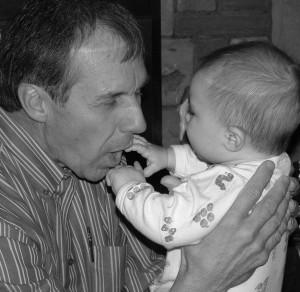 This is a question that I have struggled with a lot in the four-and-a-half years, since I had my first son, Ryan, and discovered there was a parenting approach that lined up with my parenting views. I questioned that if I didn’t practice all elements of Attachment Parenting (AP), could I really call myself an “attached parent?”
This is a question that I have struggled with a lot in the four-and-a-half years, since I had my first son, Ryan, and discovered there was a parenting approach that lined up with my parenting views. I questioned that if I didn’t practice all elements of Attachment Parenting (AP), could I really call myself an “attached parent?”
The long range vision in place for Attachment Parenting is:
To raise children who will become adults with a highly developed capacity for empathy and connection. It eliminates violence as a means for raising children, and ultimately helps to prevent violence in society as a whole.
Some of my fellow AP parents used to joke that AP stands for “always perfect.” It seemed like I was not the only one who struggled with incorporating all Attachment Parenting International’s Eight Principles of Parenting all the time.
But as I have continued down this journey of Attachment Parenting, I have realized that AP certainly does not mean always perfect. It does mean trying the best you can, with the circumstances you have, at any given moment.
No one is a perfect parent, and if that is the standard that we inadvertently hold ourselves and others to, we will feel like we have failed, sooner or later. I believe API’s Eight Principles of Parenting are wonderful guides, but in no way are a set of rules and regulations that parents must incorporate at all times, less they be considered non-AP parents.
One example is discipline and whether or not time-out is a “proper” discipline technique for AP parents.
Editor’s note: Attachment Parenting International (API) advocates the use of “time-in” versus punitive “time-out.” A time-in modifies the traditional time-out in that it gives tantrumming children a break to calm down and self-regulate before other positive discipline techniques are used, rather than using isolation as a form of punishment as in the traditional time-out.
Every parent is entitled to their thoughts on the matter, and no two parents will agree on every topic. I respect that parents have a right to not use time-outs for their family. But I find it troubling and worrisome as an AP parent that some of the thoughts seem to suggest that parents who do use time-out, are being judged.
According to API:
Positive discipline helps a child develop a conscience guided by his own internal discipline and compassion for others. Discipline that is empathetic, loving, and respectful strengthens the connection between parent and child. Rather that reacting to behavior, discover the needs leading to the behavior. Communicate and craft solutions together while keeping everyone’s dignity intact.
I object to that time-out is like spanking. Time-out is a nonviolent method, unlike spanking. I also disagree with the idea that a parent who uses time-out is teaching their children to fear them. Most AP parents use time-out as a loving and respectful discipline method, in line with API’s discipline principle. How can another parent know for sure what is happening in a household, and how certain children respond to different methods of discipline?
Ultimately, though, who are we to judge another parent?
Not every technique works for every child, and even what works today, may not work tomorrow. As parents, especially AP parents, we are always trying to fine-tune our discipline and striving to do what works best for our child while incorporating respect and gentleness in our parenting.
Our goal of practicing AP is to raise children in a nonviolent atmosphere and to ensure they will have capacity for empathy and connection. If a parent feels a nonviolent discipline method, like time-out, is the best way to achieve that goal for their child, who are we to question and judge that decision? Surely we can and should trust that parents know their children and what they may or may not respond to the best.
I feel we are treading in dangerous water when we make general statements and hold dogmatic ideas that AP parents always do, or don’t do X. When this happens, it can unintentionally cause parents to question and doubt their methods, and wonder if they really are practicing AP. If they question and doubt this enough, they can be come discouraged and give up altogether, feeling like they just can’t measure up to the “ideal.”
I think a much more productive approach would be to find out why the parent has chosen to impart a certain method, and instead of judging, listen. Perhaps the child responds best to that method, or is a high-needs, or special needs child. Perhaps we can share what we have found to work in a similar situation. That could open up ideas for the parent that maybe they had not thought of before.
By doing this, we are supporting our fellow AP parents, and really, as AP parents we all face discouragement from others in our circles who are not AP parents. The reason we joined AP was for support, not for judgment. By supporting each other, even if we don’t always agree with another parent’s decision, we strengthen our foundation, and help each other in our goals of raising empathetic and connected children- even if we take different paths to get there.
Heather blogs about life with her two boys, pregnancy and birth issues, natural living, current events, and of course attachment parenting at A Mama’s Blog.


 This is a question that I have struggled with a lot in the four-and-a-half years, since I had my first son, Ryan, and discovered there was a parenting approach that lined up with my parenting views. I questioned that if I didn’t practice all elements of Attachment Parenting (AP), could I really call myself an “attached parent?”
This is a question that I have struggled with a lot in the four-and-a-half years, since I had my first son, Ryan, and discovered there was a parenting approach that lined up with my parenting views. I questioned that if I didn’t practice all elements of Attachment Parenting (AP), could I really call myself an “attached parent?”